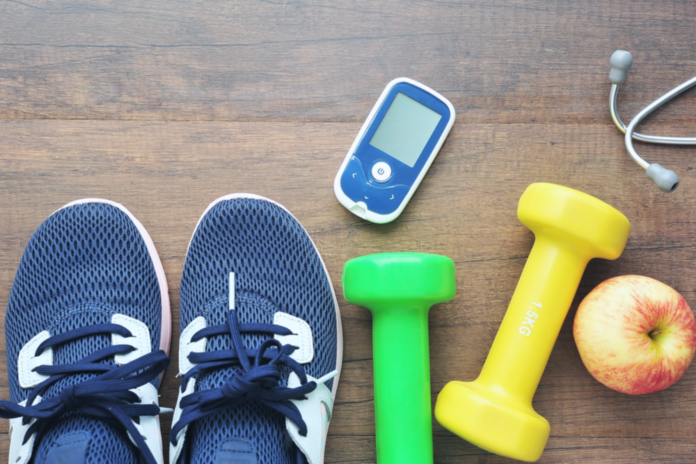Nowadays, many people understand the connection between eating healthy and reducing the risk of chronic conditions like heart disease and diabetes. However, fewer people understand how nutritious foods accomplish this. Well, one major mechanism of action involves blood sugar regulation.
In this article, learn what causes high blood sugar and how to lower blood sugar naturally.
What Is Blood Sugar?
As it sounds, blood sugar refers to the amount of glucose (sugar) circulating in the blood. Glucose enters the blood after ingesting food or when the liver breaks down glycogen, the stored form of glucose, to raise blood sugar. The hormone, insulin, then helps shuttle glucose into cells and organs for them to use as fuel.
Healthy Blood Sugar Levels
Hyperglycemia refers to elevated blood sugar levels while hypoglycemia indicates low blood sugar. Standard blood sugar levels depend on how long it has been since last eating, and thus tend to be lowest after prolonged periods of fasting and highest after eating carbohydrate-rich meals.
Generally speaking, fasting blood glucose levels under 100 milligrams per deciliter (mg/dL) are considered healthy. Values under 140 mg/dL are normal if one has eaten within the past two hours. However, healthy blood glucose ranges will differ for people with diabetes.
A long-term measurement of blood glucose is known as the hemoglobin A1c (HbA1c), and is typically used to diagnose diabetes. HbA1c measures the amount of sugar attached to hemoglobin, the part of red blood cells that carry oxygen from the lungs to the rest of the body, over a three-month period.
Basically, this value represents an average of how much blood glucose was remaining in the blood at any given time and is a great indicator of overall health. Results are provided in percentages with the following implications:
- Normal: below 5.7%
- Prediabetes: between 5.7% and 6.4%
- Diabetes: equal to or greater than 6.5%
What Causes High Blood Sugar?
Blood sugar levels are constantly shifting based on many factors, including:
- Time of day
- Content of meals
- Amount of time since last eating
- Insulin sensitivity/resistance
- Exercise
- Acute sickness
- Fasting
- Stress
However, the two most common and important causes are high carbohydrate meals and insulin resistance. These are actually kind of one in the same as will be explained shortly.
Although frequently misunderstood, glucose is a vital nutrient because it is the only form of fuel the brain and red blood cells can use for fuel. Glucose is the preferred source for all other organs as well. However, glucose cannot move from the blood into cells without insulin because this hormone unlocks parts of cells that allow sugar to enter.
For reference, people with type 1 diabetes stop producing insulin due to an autoimmune reaction. On the other hand, people with type 2 diabetes do not produce enough insulin and/or their cells are desensitized to the hormone. Without proper insulin use, glucose cannot enter the cell so it remains in the blood.
Thus, carbohydrates are not evil as often depicted, but quantity and quality are important. Over time, eating too much carbohydrate and consuming low-quality, refined, and/or processed and packaged carb sources can contribute to chronically elevated blood glucose levels.
In turn, this can lead to insulin resistance and resulting complications like diabetes, ketoacidosis, high blood pressure, heart disease, kidney problems, neuropathy, blindness, and more.
Foods That Raise Blood Sugar
- Refined/processed/packaged carbs: Chips, crackers, cookies, candy, donuts, pastries, muffins, cereals and white “wheat” products like bread and pasta. These carbs break down quickly and can cause blood sugar spikes followed by crashes.
- Sugary drinks: Soda, juice, juice concentrates, many coffee drinks, flavor syrups, creamers and sports drinks instantly raise blood sugar. This is mostly because they are already broken down into the simplest form of sugar and require no digestion.
- Alcohol: These beverages also instantly raise blood sugar, however, can actually cause low blood sugar hours after ingestion.
- Sugary condiments: Jellies, jams, and syrups are simple sugars that spike blood glucose levels quickly.
- Fruit: These delicious treats contain fructose, another type of simple sugar that raises blood glucose. However, fruits are considered highly healthy because of their fiber, antioxidant and polyphenol content. People without insulin resistance can certainly enjoy fruit a couple times a day if desired.
Many other foods technically raise blood sugar as well. However, other components of the food like fiber, protein, and fat slow the release of glucose, which minimizes some of the negative effects.
For example, the high fiber content of whole grains slows the breakdown of the starches into glucose and the protein and fat content of a “combination food” like pizza does the same.
This is a wonderful transition into…
15 Natural Ways to Lower Blood Sugar
Various ways can help lower blood sugar, with many of them involving food solutions. The most natural, healthy ways to lower blood sugar for the long haul include the following tips.
1. Eat appropriate portions of carbohydrates.
In other words, eating carbs in moderation is the easiest way to manage blood sugar. An appropriate portion is about 1/2 to 1 cup or 1 slice of bread products. Eating 1 to 2 servings in a single eating experience a couple times spread throughout the day is generally healthy.
2. Choose quality carbs.
Choosing plant-based carb sources like vegetables, fruits, and whole grains also include components that are correlated with actually lowering blood glucose!
3. Increase fiber intake.
Both kinds of fiber, soluble and insoluble, help to drastically reduce the breakdown of carbs into sugar and promote fullness.
4. Balance carbs with protein and healthy fats.
Just like fiber, fat, and protein to an even larger extent, help slow the release of glucose into the bloodstream.
5. Eat foods high in chromium and magnesium.
Interestingly, high blood sugar is linked to deficiencies in these two minerals, likely because they help regulate the metabolism and uptake of carbs.
Foods high in chromium include meat, whole grains, fruit, veggies, and nuts. Magnesium-rich foods are leafy greens, squash, pumpkin seeds, tuna, dark chocolate, bananas, beans, and avocados.
6 Add cinnamon.
Cinnamon has been shown to improve insulin sensitivity by decreasing insulin resistance and slowing the breakdown of carbs in the digestive tract after a meal.
7. Try resistant starches.
Resistant starches bypass the small intestine and ferment in the large intestine. These do not get broken down into glucose and they promote the growth of good bacteria just like probiotics do.
Most resistant starches (except ripe/green bananas!) are “created” when a cooked starch is completely cooled and then reheated. Examples include oats, barley, rice, farro, beans, peas, lentils, plantains, squash, and potatoes.
8. Consider a berberine supplement.
Berberine is an active component of an herb used traditionally in Chinese medicine, and research says it may be as effective as conventional drugs (like metformin) that lower blood sugar levels.
9. Exercise regularly.
Consistent exercise increases insulin sensitivity, meaning cells are better able to absorb blood sugar. It also facilitates muscles using blood sugar for energy and muscle contraction.
10. Stay hydrated.
Not only does drinking water prevent dehydration, but it also helps kidneys flush excess blood sugar through urine.
11. Manage stress levels.
During times of high stress, the hormones glucagon and cortisol are secreted, both of which inherently increase blood sugar. Some stress management techniques include meditation, journaling, walking, prioritizing good relationships, and self-care practices.
12. Get plenty of quality sleep.
Lack of sleep decreases the release of growth hormones (like insulin) and increases cortisol levels, which help regulate blood sugar. Sleep deprivation is also known to increase appetite, especially for high sugar foods.
13. Lose or maintain a healthy weight.
A healthy weight is correlated with better pancreas function, which is the organ that secretes insulin. And listen to this…
Research shows that a 7 percent reduction in body weight can reduce the risk for developing diabetes by 58 percent! And it seems to work even better than typical diabetes medications.
14. Do not get too hungry.
This is mostly a preventative measure because when the body feels starved, it secretes hormones and other chemical messengers that trigger intense cravings for high sugar foods. Prevent this by eating at regular intervals throughout the day.
For some, this means every 2 to 3 hours and every 4 to 6 hours for others, including an 8 to 16 hour fast (sleep is counted).
15. Keep a healthy immune system.
Another very preventative measure includes staying free of sickness, achieved by bolstering the immune system through healthy lifestyle habits. This is because acute, and to a larger extent, chronic illness increases inflammatory markers that raise blood glucose.
15 Unique Foods That Lower or Regulate Blood Sugar
The following foods include specific compounds or properties that are scientifically associated with reducing blood sugar levels or slowing the breakdown of carbohydrates into glucose and are indicated next to the food.
In general, plant compounds, antioxidants, polyphenols, and specific vitamins or minerals directly reduce blood glucose levels while both kinds of fiber, protein, and fat slow the release of glucose into the bloodstream.
1. Lean meats (chicken, turkey, eggs, seafood, red meats with loin in the name): protein
2. Beans and lentils: magnesium, soluble fiber, protein, resistant starch
3. Raw broccoli/ broccoli sprouts: plant compounds (sulforaphane, glucosinolates)
4. Okra: polysaccharide (rhamnogalacturonan) flavonoid antioxidants (isoquercitrin and quercetin 3-O-gentiobioside
5. Kale: fiber and flavonoid antioxidants (quercetin and kaempferol)
6. Avocado: soluble and insoluble fiber and monounsaturated fats
7. Pumpkin and pumpkin seeds: fiber, antioxidants, monounsaturated and polyunsaturated fats
8. Nuts and nut butters: monounsaturated, polyunsaturated, and saturated fats
9. Flax and chia seeds: fiber and monounsaturated and polyunsaturated fats
10. Fermented foods: probiotics, antioxidants, and minerals
11. Berries: soluble fiber, antioxidants (anthocyanins, ellagic acid, and resveratrol), vitamins and minerals (manganese and copper)
12. Citrus fruits with skin: soluble and insoluble fiber and polyphenols (naringenin)
13. Apples: soluble fiber and plant compounds (quercetin, chlorogenic acid, and gallic acid)
14. Oats and oat bran: soluble fiber
15. Whole grains: soluble fiber
The Bottom Line
Developing high blood sugar is complex. However, understanding how to lower blood sugar naturally can mitigate complications of diabetes and other risks.
Sleeping enough, exercising regularly, and managing stress are just a few natural ways to lower blood sugar. Sticking to a balanced meal plan filled with nutrient-dense foods is also key to lower blood sugar naturally.
References:
Hemoglobin A1C (HbA1c) Test: MedlinePlus Medical Test. MedlinePlus. medlineplus.gov/lab-tests/hemoglobin-a1c-hba1c-test/.
How Blood Sugar Affects Your Health. Revere Health. Published April 2, 2018. reverehealth.com/live-better/blood-sugar-affects-health/.
Kubula J. The 17 Best Foods to Lower (or Regulate) Your Blood Sugar. Healthline. Published August 10, 2020. www.healthline.com/nutrition/foods-to-lower-blood-sugar.
Lawler, Moira. 10 Tips to Lower Blood Sugar Naturally: Everyday Health. EverydayHealth.com. Updated October 27, 2020. www.everydayhealth.com/diabetes/9-tips-lower-blood-sugar-naturally/.
Semeco A. 15 Easy Ways to Lower Blood Sugar Levels Naturally. Healthline. Updated December 21, 2020. www.healthline.com/nutrition/15-ways-to-lower-blood-sugar.
Spritzler F. 11 Reasons Why Berries Are Among the Healthiest Foods on Earth. Healthline. Updated April 24, 2019. www.healthline.com/nutrition/11-reasons-to-eat-berries.






